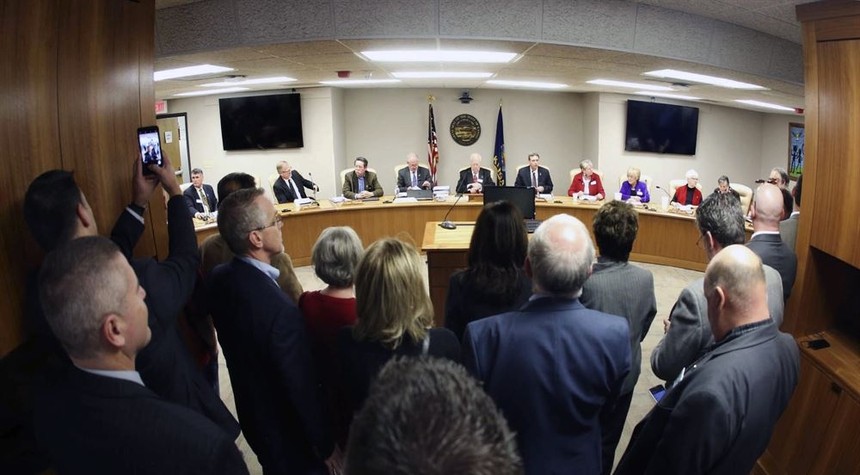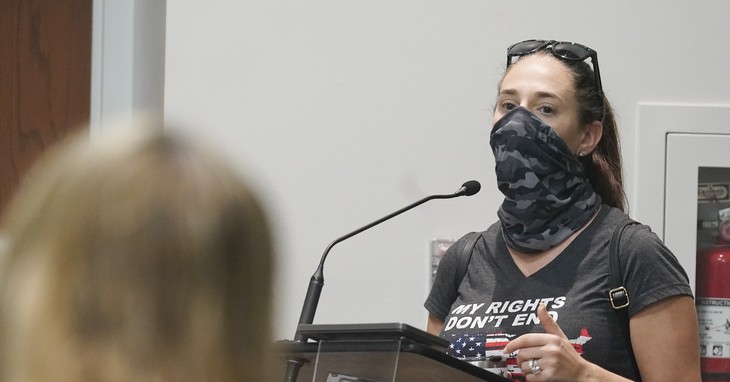National School Board Association Faces Backlash, as State School Boards Disavow War on Parents

Seems that lashing out at the people you are supposed to be serving is not working out.
Yesterday I covered how the Associated Press struggled valiantly to run interference for the National School Board Association, attempting to fact check the contention the national outfit wanted to classify parents objecting to policies at district meetings as terrorists. Joining in is PolitiFact, also attempting to nitpick details and then project the image of the claims being false.
One small problem: we are able to read the letter from the NSBA where they make their claims. As it was attempted to say they only wanted the violence at the meetings to be classified as domestic terrorists, in their message to President Biden they listed a number of examples that were non-violent in nature, most involving basic protests seen at prior meetings.
In the ensuing week, the NSBA has only received negative feedback, instead of sympathy, requiring those rescue efforts in the press. Now, there is a growing resistance seen within its own network. It has been a regular action to see various state SBAs coming forward to distance their group and state from the inflammatory public statement issued by the national group.
The first indication of internal conflict came last Wednesday when the Virginia School Board Association issued a response that was a complete disavowal of the NSBA letter’s release.
NSBA is a national association composed of the state school boards associations from each of the states in the country. While the Virginia School Boards Association (VSBA) is currently a member of NSBA, it was not consulted about this letter, did not provide information to NSBA, and was not informed that the letter was being sent.
In recent days more state SBAs have stepped forward. In Pennsylvania, when reached for comment, that state SBA delivered their own rebuttal, essentially echoing that of Virginia. “The Pennsylvania School Boards Association was not consulted prior to the letter being sent by the National School Boards Association to President Biden,” said Annette Stevenson, chief communications officer. “We were not asked for input nor discussion on its content.”

Possibly the most illustrative example of how rogue the national chamber behaved is in seeing what other state came out with a comment. In Florida, the school boards have been in a contentious battle with Republican Governor Ron DeSantis for months now, so for the state organization to come forward with its comment speaks rather loudly. The Florida School Boards Association issued its own letter of concern.
Several elements of your letter run counter to the tenets embraced by the FSBA, and this communication has caused serious concerns, conflict, and consternation for many of our members within the FSBA. Not only has it unnecessarily distracted from the important work being carried out by our members, it has strained important local and state collaborative relationships our members have worked hard to build and maintain for years.
The Florida SBA letter also indicates some of the motivation likely behind the national group’s bold statement. The FSBA declares they have not paid its recent dues to the NSBA over a variety of concerns, which were listed in their letter.
We have been clear about reassessing the value of our affiliation with NSBA due to concerns surrounding NSBA’s governance, leadership, transparency, and failure to embrace non-partisanship. Due to the fact we have not seen the changes we would have expected given the number of states, who are your members and have expressed these and similar concerns, nor have we received any promised plan or timeline to accomplish these changes, we will continue to withhold our dues until further notice.
In a statement to RedState, DeSantis Press Secretary Christina Pushaw commented on the move:
The FSBA affirmed that dissent isn’t domestic terrorism. Protests are not threats. A citizen’s criticism of their elected officials is not harassment. There is no reason for the federal government to intervene in local issues and attempt to criminalize free speech.
For a state school board locked in a firm political battle with its governor to point out the problem with partisanship within the national organization explains plenty. If more member states manage to come forward with similar statements, it may end up exposing the national association in significant fashion.
It certainly appears that the NSBA, driven by a partisan leadership, felt empowered to reach out to President Biden and have him employ a number of federal acts in defense of the group, and in an effort to stifle the growing tide of parental opposition to the actions seen over the past year. That this has instead led to not only a poor public relations result, but has compelled a number of state boards to also resist this effort is a great sign for parents that they have not been rendered helpless against the system.
